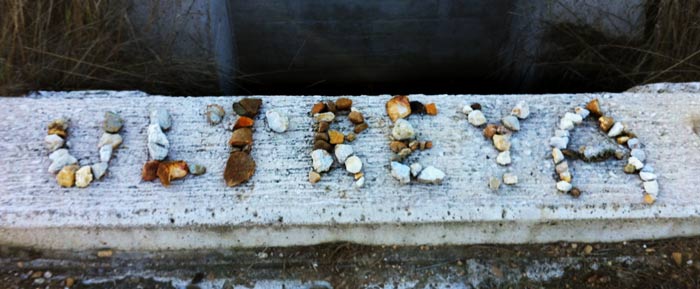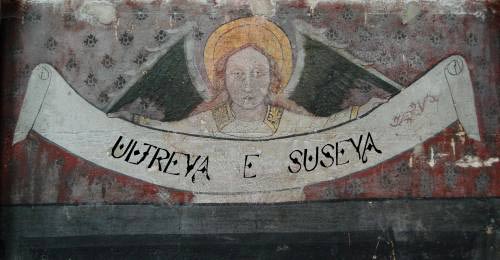Our company name is Ultreya Tours. Ultreya or Suseya are relatively common names for services providers on the Camino de Santiago (spas, restaurants, hotels, transporters and obviously travel agencies) and there is probably no expression more linked to the Camino de Santiago. But many people in Spain and on the Camino do not know what it stands for.

This post explains what we believe Ultreya means. But we would like to warn you that although we know it comes from Medieval Latin meaning “further” and it has been used since at least the 12th century no one really knows how it came to be linked with the Camino de Santiago and when people started using it.
Etymology of Ultreya Suseya Santiago
There are many ways to write Ultreya. We chose the version with a Y to make it easier for foreigners to read but Spaniards prefer to write “Ultreia” and in France, they add two points – “Ultreïa”. You might also see “Eultreya”.
Etymologically the word is composed of the two latin prefix:
- “Ultra” – meaning “on the far side of, beyond.”
- “Eia” or “hēia” – expressing delight, playful remonstrance, encouragement – aha! come now! come on!

Nowadays, on the Camino pilgrims might great each other with a simple “Buen Camino”, but if you were to walk in Medieval times, when meeting another fellow pilgrim you would say “Ultreya”, meaning let’s go further, to which they would respond “e Suseya Santiago”, and higher, to Santiago de Compostela.
E ultreia, e suseia, Deus adiuva nos – in the Codex Calixtinus
The first written occurrence of the expression is in the Codex Calixtinus, a XII-century manuscript jewel considered to be the first guidebook and the most famous guide to the Camino of Santiago.
Here are some extracts of the musical part of Appendix II where the expression appeared, in the “Dum pater familias” (When that good Father), known as the “Song of the Flemish pilgrims” or “the Ultreya Song” where pilgrims ask for Saint James help along the Way.
 E ultreia, e suseia, Deus adiuva nos.Herru Santiagu,
E ultreia, e suseia, Deus adiuva nos.Herru Santiagu,
Got Santiagu,
E ultreia, e suseia,
Deus adiuva nos.
¡Oh Señor Santiago!
¡Buen Señor Santiago!
¡Eultreya! ¡Euseya!
¡Protégenos, Dios!
The expression also appears in the musical part of Appendix I, in the hymn “honorary regis summi” (In honour of the High King), which contains the verse:
Unde laudes regi regum
solvamus alacriter,
Cum quo leti mereamur
vivere perhenniter.
Fiat, amen, alleluia,
dicamus solempniter
E ultreia esus eia
decantemus iugiter.
Por eso al Rey de los reyes
loas debemos decir
para merecer felices
por siempre con El vivir.
Hágase, amén, aleluya,
-digamos, pues, a la par-,
E ultreya esus eya,
cantaremos sin cesar.
Tous les matins by Jean-Claude Benazet
Nowadays the expression is rarely used as pilgrims prefer the modern version “Buen Camino”, “bom Caminho” in Portuguese or “Bon Chemin” in French.
But the expression is regaining popularity especially in France since the French pilgrim Jean-Claude Benazet wrote in the mid 70s “Tous les matins”, a song to help motivate pilgrims to get up every morning and continue their long walk despite the adversities. Mr Benazet became within the French pilgrim community a spokesman for the Camino and his song is nowadays sang at most International Camino reunions and regularly within the abbey of Conques on the Le Puy Route.
The song goes as such:
Tous les matins nous prenons le chemin,
Tous les matins nous allons plus loin.
Jour après jour, la route nous appelle,
C’est la voix de Compostelle.
Ultreïa ! Ultreïa ! E sus eia
Deus adjuva nos !
Chemin de terre et chemin de Foi,
Voie millénaire de l’Europe,
La voie lactée de Charlemagne,
C’est le chemin de tous mes jacquets.
Ultreïa ! Ultreïa ! E sus eia
Deus adjuva nos !
Et tout là-bas au bout du continent,
Messire Jacques nous attend,
Depuis toujours son sourire fixe,
Le soleil qui meurt au Finistère.
Ultreïa ! Ultreïa ! E sus eia
Deus adjuva nos !

Suseya or the way back
Canadian author Sue Kenney – suekenney.ca – suggests that pilgrims on the way to Santiago would say “Ultreya” to which pilgrims on their way home would respond “Suseya”. For her the term would be intrinsically linked to the way back, which was at the time a very important part of the Camino de Santiago with no easy transportation means.